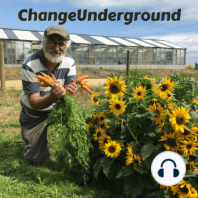6 min listen
39 #worldorganicnews 2016 11 07
ratings:
Length:
8 minutes
Released:
Nov 7, 2016
Format:
Podcast episode
Description
Links Why do we work? – Hawthorn Rising http://www.worldorganicnews.com/50921/why-do-we-work-hawthorn-rising/ Organic egg industry pits factory farms against family farms | Agweek http://www.worldorganicnews.com/50885/organic-egg-industry-pits-factory-farms-against-family-farms-agweek/ A Paradigm Project for the future – Location: Morocco : Augusta Free Press http://www.worldorganicnews.com/50878/a-paradigm-project-for-the-future-location-morocco-augusta-free-press/ **** This is the World Organic News Podcast for the week ending 7th of November 2016. Jon Moore reporting! The blog Hawthorn Rising brings a post: Why do we work? It begins with a quote from Masanobu Fukuoka author of The One Straw Revolution. Quote: “I do not particularly like the word ‘work’. Human beings are the only animals who have to work, and I think that is the most ridiculous thing in the world. Other animals make their livings by living, but people work like crazy, thinking that they have to in order to stay alive.” End Quote. The post goes on to suggest we currently need to work to cover bills, debts etc. and then end with the sentence: Quote: It wasn’t always this way, and needn’t be in the future either, however we would have to change our expectations drastically! End quote. This needs some unpacking. Let’s begin. We work because we live in a system which has created a value for work. The protestant work ethic springs to mind. From this follows, amongst other things, the need for efficiency, rational use of resources, the abhorrence of idleness and so on. Fukuoka refers to the days of his childhood when the local farmers grew sufficient food for themselves and had a surplus by farming between Spring and Autumn, that would be Fall for the North Americans out there. During winter they and their soils rested. The farmers hunted rabbits, repaired tools, met and recuperated. This meant they had time for reflection, for poetry, for being fully human. Whilst Fukuoka spoke against the idea of work, he was not opposed to labour. He happily put the hours in when they were needed. He was just opposed to the battery hen world of factories and offices. If we take a further step back we can see the concept of work, of the protestant work ethic and economics in general are based upon the principle of shortage. My economics textbook began with the statement: “Economics is process where unlimited wants negotiate finite resources.” For most of human existence this has been the case. Fisher-gatherer-hunters solved this riddle by matching the carrying capacity of their domain to their population. As the species travelled out of Africa across five of the other six continents this wasn’t so great a problem. There was always more land, more resources and so on. Then in the years between the various points of domestication, The Fertile Crescent, Mesoamerica, East Asia and sub saharan Africa, the shortage of available resources was negotiated through power structures and work. Those in elite positions needed not to work and the great masses had to work or they starved. There were times when starvation came despite any amount of work but the general principle holds true. Since the beginning of the industrial revolution this notion was solidified into reality. The need to work to justify an existence, to define masculinity, to not be a welcher on society became ingrained. This was reinforced through religion with statements like: “Idle hands do the devil’s work” and so on. This is the system which forced the notion of efficiency and productivity on the farmers of Masanobu Fukuoka’s part of Japan. They changed from farming for three seasons and contemplating for one to continuous production based upon oil derived fertilisers, pesticides and herbicides. The system of Natural Farming developed by Fukuoka returns to a condition of continuously available food, minimal labour and community creation. On a technological level we are approaching a point where not just the drudgery
Released:
Nov 7, 2016
Format:
Podcast episode
Titles in the series (100)
06 #worldorganicnews 2016 03 07: This week we look at urban agriculture, convertin… by ChangeUnderground
